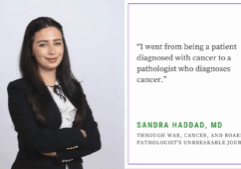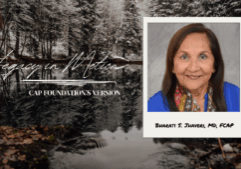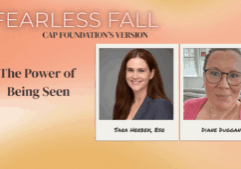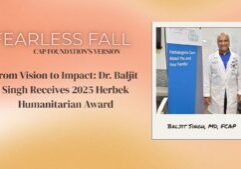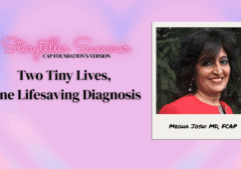Q&A: Sara Herbek on Legacy and the Foundation
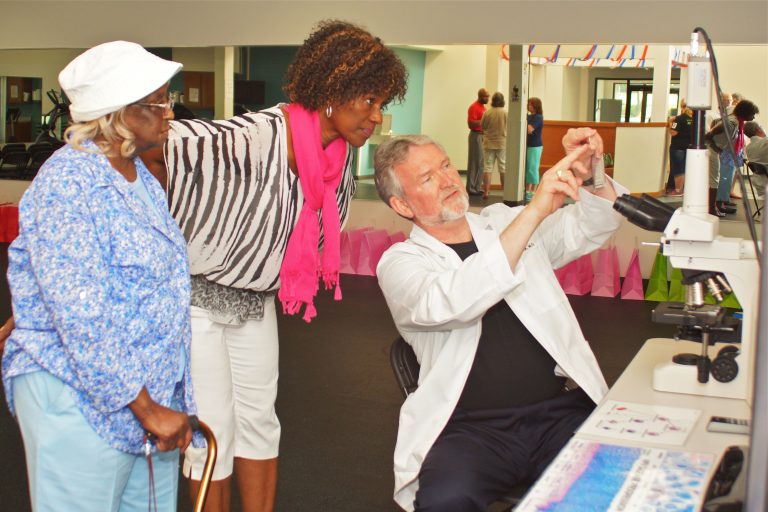
Over 20 years ago, Gene Herbek, MD, FCAP, started the first See, Test & Treat program to provide free cervical cancer screening to underserved communities in the Standing Rock Indian Reservation.
After Dr. Herbek’s passing in June 2020, his daughter Sara Herbek continues his legacy by serving as a director on the CAP Foundation board and participating in several CAP Foundation committees. When not volunteering her time to the CAP Foundation, Sara is a corporate immigration attorney in Chicago. The CAP Foundation sat down with Sara to discuss her father’s legacy, what she learned about health care from a pathologist, and her hopes for the CAP Foundation’s future.

Sara Herbek, member of the CAP Foundation Board of Directors
How did your father influence you?
My father influenced me as a person in so many ways it’s hard to summarize, so I’ll do my best. Love hard; be a good person and do good; treat others with kindness and respect; go after your passion, work hard, and live your life to the fullest; it’s OK to agree to disagree because there is always a compromise but make sure to advocate for your beliefs; do your best; and sometimes it’s easier to beg for forgiveness than ask for permission.
What do you see as your father’s legacy on pathology? How did that impact your decision to volunteer with the CAP Foundation?
To me, my father’s legacy is his commitment, service and advocacy for the CAP, the CAP Foundation, his colleagues, and his patients.
His legacy is the reason why I wanted to serve as a Director on the CAP Foundation Board. I believe in pathologists and their essential role within health care. By being on the board, I can serve in small way to further pathologist’s visibility in the medical profession and hopefully support their careers.
What have you learned about health care by having a pathologist in the family?
Because of my father, I know how critical pathologists are to health care. Without pathologists, health care would come to a halt. Pathologists are also uniquely situated to advocate for patients and standards of care.
I also learned to be your own health care advocate and ask questions. If you don’t understand everything you need to know regarding your health, keep asking until you have the information you need to feel comfortable.
I was exceptionally lucky, when a doctor would reference blood results such as a good Vitamin D count, I knew I could call my father and ask why that matters. Now, I ask my doctors to get the clarity I need. I’ve often felt it would be great to hear my test results from the pathologist who reviewed each sample and provided each finding. I had that option through my father, and it was extremely insightful.
What would be the first thing you’d tell someone who hadn’t heard about See, Test & Treat or the CAP Foundation?
Starting with See, Test & Treat, I’d talk about how fortunate many of us are to have access to excellent health care and how there are many women who don’t and deserve care, which they can receive through this program.
I’d also tell them about the importance of the grants provided by the CAP Foundation, in particular to residents. I know several pathologists who are active members of the CAP because of the CAP Foundation’s support in their residency. Through the CAP Foundation’s support of residents, we are securing the future success of the CAP, which I think is fantastic.
Why is it important that you continue your father’s legacy through the CAP Foundation?
We would love to expand each of our current programs, increasing the number of See, Test & Treat programs each year as well as supporting more young pathologists in pursuing their careers.
But for that, the Foundation needs more support. We’re extremely thankful to those who donate their time or money to further our programs.
Learn more about how you can get involved with the CAP Foundation and support its many programs.
More Stories
Why Donate
Every person deserves a diagnosis. Support care beyond the microscope. Expand access to pathology-locally and globally.

